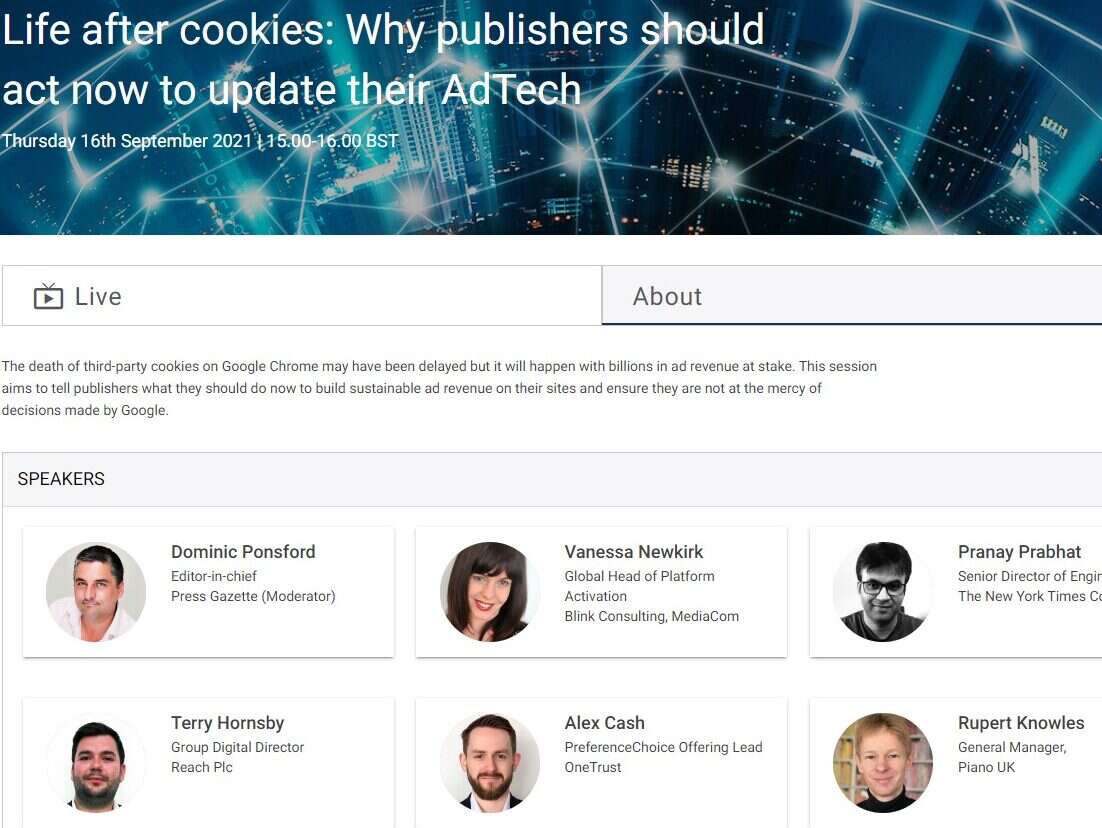
Programmatic advertising has got a “bad name” but could “work really hard” for trusted publishers in the future, especially as third-party cookies become obsolete, according to ad and publishing industry experts.
How to make programmatic ads work was one of the themes of Press Gazette’s second Future of Media Technology webinar about life after cookies and why publishers should act now to update their adtech.
The webinar was hosted by Press Gazette editor-in-chief Dominic Ponsford, with the following panellists:
- Vanessa Newkirk, global head of platform activation, Blink Consulting, MediaCom
- Pranay Prabhat, senior director of engineering, The New York Times Company
- Terry Hornsby, group digital director, Reach Plc
- Alex Cash, PreferenceChoice offering lead, OneTrust
- Rupert Knowles, general manager, Piano UK
The panellists all agreed programmatic advertising had been “abused” and been given a “bad name”, particularly because of clickbait websites that took traffic from traditional publishers.
So-called clickbait-driven “made for advertising” sites receive around 12.3% of global programmatic web display ad spend, according to Jounce Media research cited in Morning Brew this month.
Piano’s Rupert Knowles said: “These aren’t quality sites, but people are exploiting the current system, and I don’t think anyone is going to shed a tear at the impact that the disappearance of cookies is going to have on those particular sites.
“But hopefully that money that would have been spent on those sites will return back to traditional publishers and publishers of quality.
“We’re certainly trying to enable many of the publishers to put in strategies to help them collect first-party data, zero-party data, to be able to understand those audiences to create things like lookalike segments as well, to be a lot more intelligent in how they can target and how they can have those direct relationships with brands rather than being disintermediated.”

Pictured clockwise from top left: Press Gazette editor-in-chief Dominic Ponsford; Vanessa Newkirk, global head of platform activation, Blink Consulting, MediaCom; Pranay Prabhat, senior director of engineering, The New York Times Company; Rupert Knowles, general manager, Piano UK; Alex Cash, PreferenceChoice offering lead, OneTrust; Terry Hornsby, group digital director, Reach Plc
Knowles said there is generally a “drive towards quality” and that the issue “goes back to trust and it goes back to building a product of value that customers want to come back to, that customers are willing to give their data, willing to give their consent”.
People are much more likely to offer up their data if they understand what it will be used for, he added, which will help as programmatic does still provide “significant efficiency” for reaching certain target audiences.
“But I think certainly the whole system has been abused over the last few years and there are lots of different partners in the ecosystem as well – it’s quite confusing, there’s lots of different actors, there’s lots of people taking cuts at different points as well within the whole process and I think hopefully that we’ll see that cleaned up quite considerably as we go forward,” Knowles said. “So I think it will continue in some contexts, but maybe not in others.”
Blink Consulting’s Vanessa Newkirk advised partnerships and trust are the most important factors to advertisers now.
“I think advertisers value transparency quite a bit, and safety, and I think that’s where publishers will have an edge,” she said.
Newkirk said the rise of programmatic had led to a focus on quantity at low cost for advertisers, but now a focus on quality and transparency is key as the focus shifted to first-party data and trusted content during the Covid-19 pandemic.
She said programmatic is “not going to go away but there’s going to be a blend and a balance there is a role for it”.
Personalisation Insights: How to improve website targeting, content monetisation and advertising revenue using zero and first-party data. Read research, insight and tips from Piano.
‘Bold decision to own the data’
At the New York Times there was a desire to become a “first-party data-oriented ads business”, Pranay Prabhat said, even 24 to 36 months ago before changes to third-party cookies came to the fore.
“We made a bold decision to own the audience data, and [asked] how can we build products which are more machine learning focused, how do we ramp up a data science team [and] think about lookalike modelling and understand the consumer behaviour better than what we use to from an advertising perspective,” he said.
Although the NYT is a primarily subscriptions-based business, with about 8m paid subs across print and digital at the end of the second quarter, Prabhat said advertising was treated as a “complementary sibling”, especially on the direct-sold side.
Of programmatic, he said: “We understand that there is a lot of innovation happening on that side and I think that’s an area which we want to be better at compared to what we used to be and I think this third-party cookie sunset is giving us that opportunity to understand the technology better [and] see what’s going on.”
‘Personalised websites the dream’
Terry Hornsby of Reach, the UK’s largest commercial publisher, said the programmatic space had got “somewhat a bad name” due to some of its technologies being used in the wrong way – for example by continuing to advertise something to a user which they have already bought. Instead, if publishers understand their users they can tell advertisers and agencies about the purchase and show logical follow-up ads – such as how to decorate a house.
“We have to be smarter with what signals we get from users we can use in programmatic advertising for buyers,” Hornsby said.
“I think programmatic in its original sense of long-tail non-trusted publishers is going to go away and I think the cookie will help with that. But I think [for] publishers like us… there’s a place for us to go. We can make programmatic advertising work really hard for the buying side.”
Reach is currently working towards providing users with totally personalised websites, Hornsby said. He was not snobbish about so-called “trashy” content overall, saying: “Who’s to question somebody who wants to see seven articles on Love Island versus a long-form content on politics?”
“My dream is that people will come onto our platforms and they will get the news site they deserve – the things that they’re interested, in the things that they’ve looked at in the last three, four months,” he said. This would refine the current way of showing users other stories related to Love Island, for example – instead the related articles could be about the same people and subjects in particular.
“Unfortunately we can’t do that in paper – we can’t get somebody to go into the local newsagent and that personalised paper is for them – but we can do that with web, and I think that’s why our task over the next 12 to 24 months is how do we get that personalised interest site that people come on and everything they see they’re interested in.”
OneTrust’s Alex Cash noted that the “seismic shifts” being seen around third-party cookies have not come as a result of regulatory or legislative changes but because of market shifts and consumer expectations.
[Read more: Google delays death of third-party cookies to end of 2023]
Cash said: “This is not going away. This is not just a blip. This is a fundamental shift in the way that we need to think about consumer choice and data and these consequences that are forcing us to think about privacy-first, trust-first are, more than anything, an opportunity if we get it right for organisations to change the way that they interact with their readers and with their customers.
“We like to see this as an opportunity and we work with many publishers who do so as well. But I think the key takeaway that I would leave anyone here is that it’s not about legislation, it’s not about regulations, it is about consumer trust and those type of relationships that we need to manage in order to sustain a business but grow those relationships moving forward.”
Remaining events in the series
- 23 September, 3pm: Content management in the age of digital disruption
- 30 September, 3pm: What are the latest and most lucrative online subscription strategies?
Visit the Future of Media Technology event website to find out more and book a place.
Email pged@pressgazette.co.uk to point out mistakes, provide story tips or send in a letter for publication on our "Letters Page" blog
